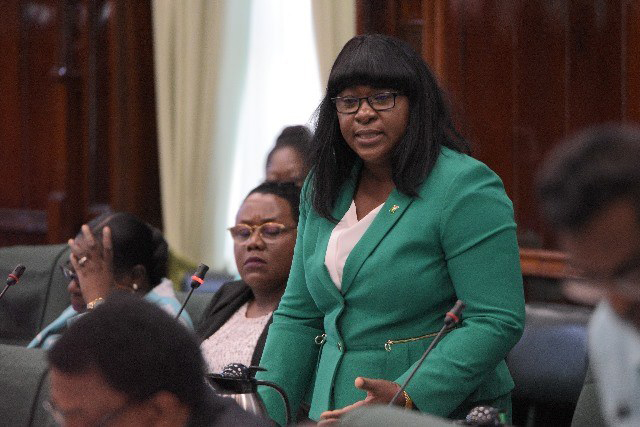The Ministry of Public Health is seeking to enable pregnant women in the hinterland access to HIV testing, according to Junior Minister Dr. Karen Cummings, who says focus is being placed on building capacity in the regions to have adequately-trained personnel who can use HIV testing kits.
A recent study produced by the United Nations Children Fund (UNICEF) in collaboration with the Ministry of Indigenous Peoples’ Affairs found that indigenous women are not accessing HIV testing.
Human rights activist Sherlina Nageer, in a letter published in the September 27 edition of the Stabroek News, labeled the situation “a completely unacceptable state of affairs.”
“The situation for people in the hinterland is especially concerning as there are already fewer resources and facilities in that area, compared with the coastal regions of Guyana (a fact corroborated in the report cited above). In fact, research project after research project has clearly and repeatedly described the increased vulnerability of women and girls in the interior regions to sexual abuse and predation, trafficking, violence, and other societal ills,” Nageer wrote.
She pointed out that antenatal HIV testing of pregnant women has been recognised for over two decades as one of the best ways of preventing the vertical transmission of HIV and that treatment of HIV-positive pregnant women with antiretroviral medication can prevent disease transmission to the infant.
“The Ministry of Public Health is working assiduously to remedy the issue of lack of trained staff by building the capacity in the hinterland regions so that adequately trained personnel will be available to effectively use the HIV Testing Kits,” Dr. Cummings said in response to questions from this newspaper.
She pointed out that the report is comprehensive and focuses on a number of pertinent issues that affect indigenous peoples.
While the report covered various aspects of indigenous women’s lives, including violence, Cummings sought to address the health issues and to highlight how the ministry will address the shortcomings that were found.
In the area of maternal health, Cummings disclosed that the ministry is currently embarking on an US$8 million project with support from the Inter-American Development Bank (IDB) in maternal child health, which will benefit all Guyanese including the Indigenous people.
She said the ministry, through its Maternal and Child Health Programme, has been working assiduously to reduce and ultimately eradicate maternal mortality in Guyana.
“As a government, we recognise that the risk of maternal and infant mortality and pregnancy-related complications can be reduced by increasing access to quality preconception (before pregnancy) and inter-conception (between pregnancies) care across Guyana,” Cummings said.
She added that the ministry recognises that antenatal care needs to be continuously addressed and added that the ministry aims to continue to support local health facilities by providing essential equipment and supplies, as well as strengthen the quality and reach of services provided by community health workers close to mothers’ homes.
“Every mother deserves a healthy, full-term pregnancy, and every baby should have an opportunity to survive and thrive. As health professionals in the Guyana public health system, this goal is one of our strategic priorities,” she said.
Nutrition
The Multiple Indicator Cluster Survey (MICS) of 2014, on which the recent study based as a follow-up, found that 16% of indigenous babies are born below 2,500 g; anaemia is high among indigenous women; the cost of food in the villages is higher when compared to the coast; and the low intake of nutrients among the Indigenous population.
In response to this aspect, Cummings said that her ministry has a vision that Guyana’s peoples will be among the healthiest in the Caribbean by the year 2020.
While the minister did not set out how this would be done, she noted that her ministry introduced micro-nutritional supplements, otherwise known as Sprinkles, to children in the hinterland regions for children up to age five years. This programme is being done in line with the ministry’s policy to ensure all children are receiving the right amount of nutrients from their meals on a daily basis.
The distribution of the sprinkles supplement was introduced to the population several years ago under the PPP/C. It is not clear if this is a new programme with the same supplement.
According to the minister, the supplement is very instrumental in combating anaemia in particular, and even works effectively to improve significantly the maternal health of women when used by pregnant women.
The minister said that the supplement will be provided to all pregnant women who sign up for services at primary health care facilities within respective regions.
The study found that in the area of healthcare in the hinterland, the nutritional status of indigenous boys and girls in Guyana needs attention, as it has been recorded as being poorer than the national average. One in every four indigenous children is, as the report stated, “stunted,” creating serious consequences for their cognitive and physical development.
The study also found that in terms of disease and infections, the most common ones are diarrhoea, the common cold and malaria. It said that while these diseases have been linked to seasonal cycles, they are also influenced by poor nutrition, limited access to improved sources of drinking water and the lack of sanitation and hygiene among children and adults.
“Nutrition is the single most important attribute in human existence that must be taken seriously at all times. We eat food to live and more importantly we are what we eat,” Minister Cummings said in response.
She said consuming a sensible, balanced diet will help to achieve optimal health throughout life.
She disclosed that the Food Policy Department of the Ministry of Public Health and a multi-sectorial team continue to revise and update the Food Based Dietary Guideline to ensure healthy eating. Also, the ministry of will launch a high impact implementation plan on food policy, which will involve all key stakeholders, at the end of November.






